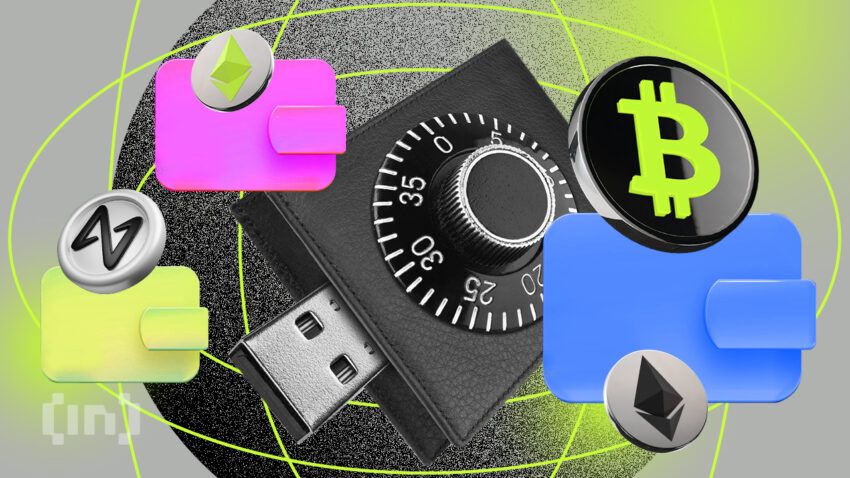Setting up a crypto wallet isn’t rocket science. Yet, while most processes aren’t technically difficult, knowing the basics to ensure your digital assets are safe and sound is crucial. In this article, we will discuss how to set up a crypto wallet to ensure safe asset storage in 2024.
KEY TAKEAWAYS
• To set up a crypto wallet, choose a wallet type, create a new wallet, back up your recovery phrase, and set up a PIN or MFA.
• Crypto wallets are computer programs that allow you to store, send, and receive cryptocurrencies.
• There are two main types of crypto wallets: hot and cold, with further subcategories within each type.
How do you set up a crypto wallet?
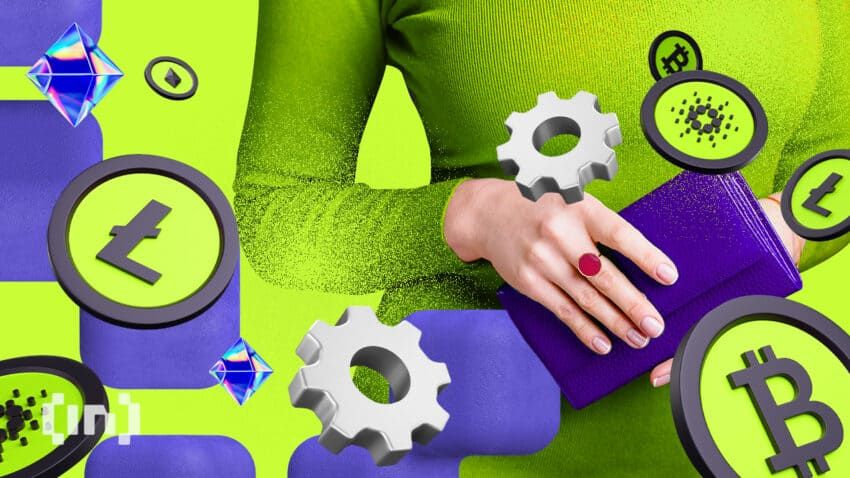
The steps for setting up a crypto wallet vary from wallet to wallet. However, the process generally goes as follows:
- Choose a wallet type
- Create a new wallet
- Backup your recovery phrase (if applicable)
- Setup a PIN or multi-factor authentication (MFA)
Hosted wallets
First, you need to pick a trustworthy platform to host your wallet. Look for a provider with a proven track record that prioritizes security, user-friendliness, and compliance with government and financial regulations.
No need to compromise on any of these features; after all, it’s your money we’re talking about. To illustrate how to set up a crypto wallet, we will use ZenGo’s wallet offering.
1. Download your hosted wallet (e.g., ZenGo). It is best practice to only download applications from the official website, the App Store (IOS), or the Google Play Store (Android).
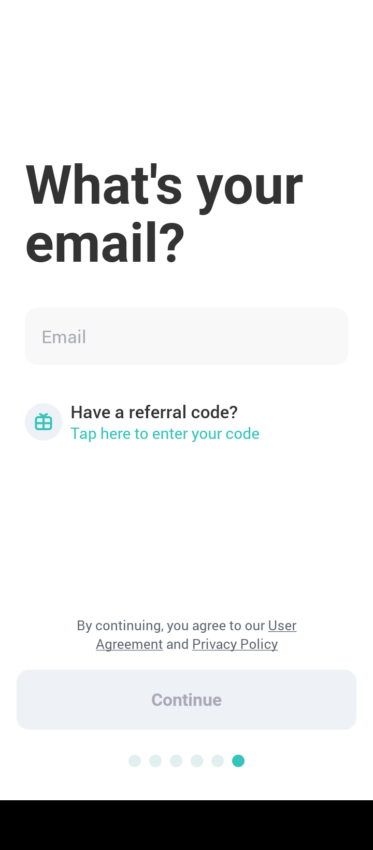
2. Hosted wallets often require you to provide an email. After you submit your email, you will receive a verification link.
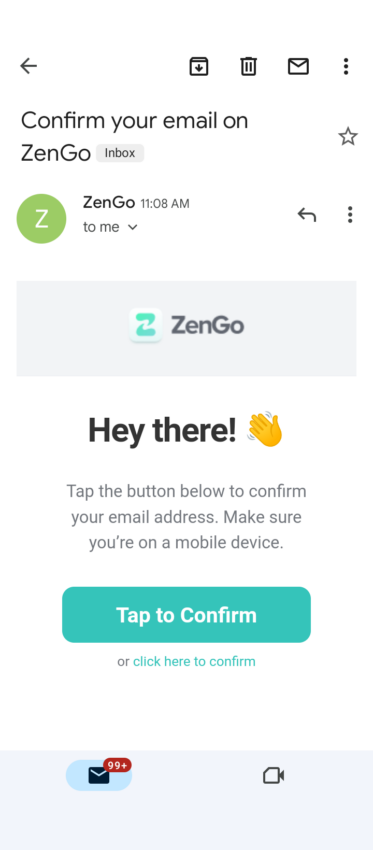
3. After you confirm your email, you will be directed back to the ZenGo app.

4. To access a hosted wallet’s full features (e.g., third-party payment providers), you often need to KYC (provide some personal information). In our example, you will need to provide a face scan. ZenGo uses a mathematical representation of your face, instead of your actual face, stored on its servers in case you delete the app or switch devices.
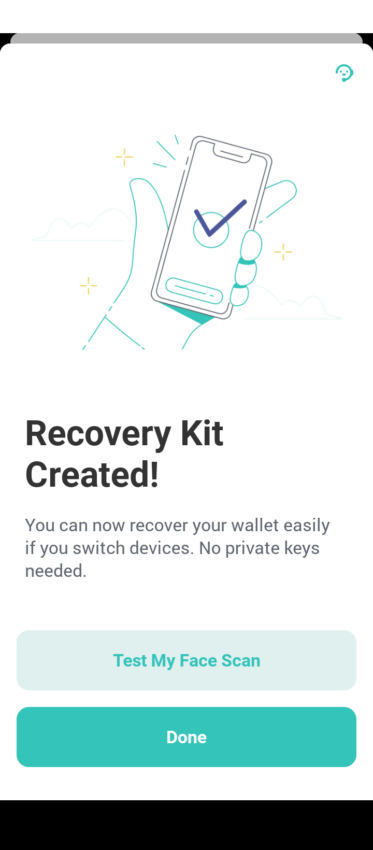
5. Voila, you are now web3 ready! Once you’ve found a platform you’re comfortable with, it’s time to create your account. Fill in your personal information, select a strong password, and consider enabling two-factor authentication (2FA) to add an extra layer of security. With these simple steps, your hosted wallet will be up and running quickly. Simple as that.
Hardware wallets
To set up a hardware wallet, follow these simple steps:
- Purchase the hardware: Choose a hardware wallet from a reputable brand such as Ledger, Trezor, or SafePal. All of these brands have a proven track record of providing good security and user-friendly interfaces.
- Install the software: Each hardware wallet brand provides proprietary software you must install to set up your wallet. Download the software from the official company website and follow the instructions carefully to create your wallet.
- Load your wallet with some digital assets of your choice. Unfortunately, you can’t just hand over some cash or swipe a credit card to fill up your wallet. Instead, you’ll need to transfer some existing cryptocurrency from another wallet or exchange.
What is a crypto wallet?
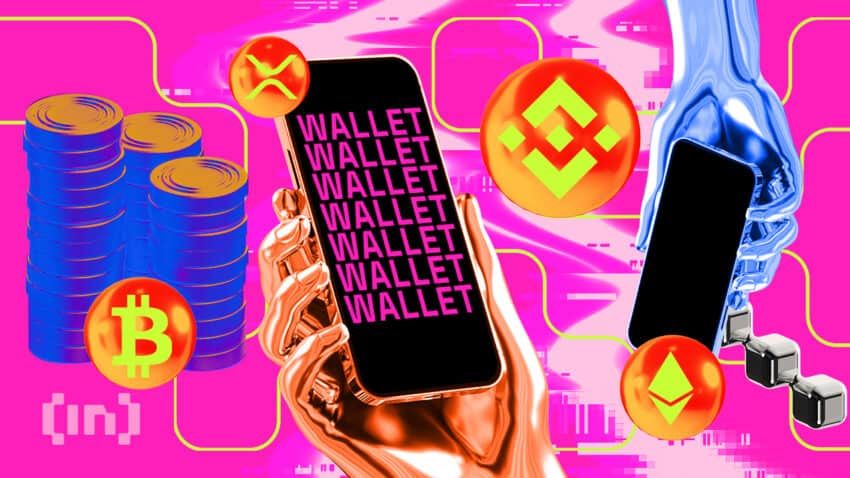
Crypto wallets are digital programs allowing you to securely store, send, and receive cryptocurrencies such as Bitcoin, Ethereum, and Dogecoin.
It’s important to note that your actual cryptocurrency doesn’t physically exist in your wallet. Instead, your wallet stores the public and private keys to the underlying blockchain of that particular asset. The wallet uses these keys to track and manage your holdings on the blockchain.
The public key is more like a virtual address that you can share with others so they can make transactions with you. Meanwhile, the private key is a secret code you must keep to yourself. The private key gives you ownership over your cryptocurrencies. Therefore, you need it to access your funds and make transactions.
Types of crypto wallets
Cryptocurrency wallets include software wallets you can install on your smartphone or computer. There are also hardware wallets, similar to USB flash drives. These physical devices are designed to store your keys offline, making them less vulnerable to breaches. You can divide these wallets into further categories: hot wallets and cold wallets, as well as custodial and non-custodial wallets.
| Type | Definition | Pros | Cons |
|---|---|---|---|
| Hot wallet | Maintains a constant connection to the internet | Convenient for frequent transactions | More vulnerable to internet-based vulenrabilities |
| Cold wallet | Does not maintain a constant connection with the internet | Extremely secure | Inconvenient for frequent transactions |
| Software | A wallet that is installed on a computer or mobile device | Portable from one device to another | Only as secure as the device it is installed on |
| Hardware | A counterparty holds private keys in part or in whole | Built using more sophisticated technology | Inconvenient for frequent transactions |
| Custodial (hosted) | A counterparty holds private keys in part or in whole | More suitable for beginners | Has counterparty risk |
| Non-custodial | Only the owner has access to the private keys | Does not have counterparty risk | More susceptible to user error |
What are hot wallets?
A hot wallet is connected to the internet so that you can access it online. These wallets are generally used to store relatively small amounts of cryptocurrencies that you plan to trade or use in everyday transactions.
Despite being convenient, hot wallets come with certain risk factors. Because they are connected to the internet, they are more vulnerable to hackers and other security threats. Hot wallets are generally available as desktop, web, and mobile wallets.
There are two types of hot wallets:
- Hosted wallets (a.k.a. custodial wallets)
- Non-custodial wallets (a.k.a. self-custody wallets)
Hosted wallets (custodial)
Hosted cryptocurrency wallets are digital wallets managed by third-party service providers — for example, a cryptocurrency exchange. These wallets are also called “custodial wallets” because the service provider has custody of the private keys to the wallet. In other words, a third party stores your crypto assets on your behalf, much akin to how a bank holds your funds in a savings or current account.
Hosted wallets are typically web-based and can be accessed using a browser or mobile app. They are easy to set up, and users can quickly buy, sell, and store crypto without worrying about managing their private keys.
The downside is that with hosted or custodial wallets, you entrust a centralized business with the custody of your digital assets. As a result, if the custodian is hacked, goes bankrupt, or acts maliciously at any point, you might as well kiss your funds goodbye. (As the saying in the crypto community goes, “not your keys, not your coins!”).
Non-custodial wallets
As the name suggests, a non-custodial crypto wallet is the opposite of a custodial or hosted wallet. They allow users to manage their digital assets without relying on third-party custodians. You have complete control over your funds in a non-custodial wallet so long as you have the private key.
Non-custodial wallets are popular because they offer users more security and privacy than custodial wallets. That said, non-custodial wallets also come with risk factors. For instance, because the private key is the only way to access the funds, keeping it safe and secure is important. If you lose your private key, you may irretrievably lose your funds.
Additionally, non-custodial wallets require users to be more vigilant about security threats such as phishing attacks, malware, and physical theft.
What are cold wallets?
Cold wallets are the go-to choice for any crypto user who prioritizes security over convenience. These wallets typically come in the form of a physical device (e.g., a USB stick) and are not connected to the internet.
Because cold wallets are not connected to the internet, they tend to be more secure than hot wallets. They’re a great option for people with large crypto stashes or those who want to HODL their crypto for a long time without worrying about hackers stealing funds.
The downside of cold wallets is that they can be less convenient than hot wallets. Users must physically connect them to a computer to make transactions. But for many crypto holders, the extra security is worth the trade-off in convenience.
Note that you can also use paper as a cold wallet. A paper wallet is a physical copy of your cryptocurrency’s public and private keys printed on a piece of paper. It is the simplest and most cost-efficient way to store cryptocurrency offline. However, as you would imagine, paper wallets are vulnerable to theft, water, and fire damage.
How to choose the best crypto wallet
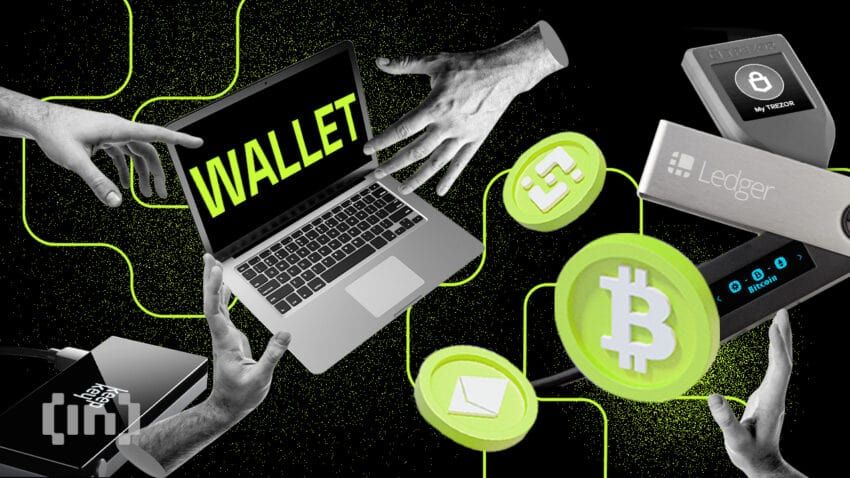
Now that you’re familiar with the basics of crypto wallets and how to set them up, the next important question is how to select the ideal wallet from the options available in the market to secure your crypto. Here are some key aspects to consider.
Security
Security should be your top priority when picking a new crypto wallet. You want to ensure your wallet has strong security features that protect your digital assets from hackers and malicious actors. The best wallets combine multiple security features, such as two-factor authentication, multi-signature capabilities, and cold storage.
User interface
The user interface is another crucial factor when choosing a cryptocurrency wallet. Ideally, you want to choose a wallet with an intuitive interface that is easy to navigate and use — more so if you are new to crypto. A good user interface makes it easy to view your balance, send and receive digital currencies, and access other important features.
Supported cryptocurrencies
Some wallets, by design, only support a limited number of cryptocurrencies, while others support a wider range of digital assets. It’s important to ensure that your wallet supports all the digital currencies you plan to invest in, not just the most popular ones.
Track record
Reputation is a key factor to consider when choosing a cryptocurrency wallet or any financial tool. Choose a wallet with a good reputation in the industry that has earned the trust of the broader community.
Customer support
Select a wallet with a reliable customer support team that can help you resolve any issues. A good wallet should have various customer support channels, including email, phone, and live chat.
Fees
Some wallet providers charge high transaction fees, while others are comparatively easy on your pocket. Compare the fee structures of all the wallets you have shortlisted and choose the one with the lowest fees if it also meets your criteria.
Mobile or desktop
You should also consider whether you want a mobile or desktop wallet. A mobile wallet is a convenient option if you can access your digital assets on the go. On the other hand, a desktop wallet is a good option if you plan to store your digital assets for an extended period. Some wallets offer both versions for multiple devices, while others are more limited.
Securely navigate crypto with your new wallet
To summarize, crypto wallets are essential for investing in or using cryptocurrencies. Now you know how to set up a crypto wallet, getting started is a relatively straightforward process involving a few simple steps. You might prefer the security of a hardware wallet or the convenience of a non-custodial hot wallet. Either way, it’s crucial to follow best practices to protect your funds.
Frequently asked questions
Why do you need a crypto wallet?
How can I keep my crypto wallet safe?
Which type of wallet is the best one?
What are cold and hot wallets?
Disclaimer
In line with the Trust Project guidelines, the educational content on this website is offered in good faith and for general information purposes only. BeInCrypto prioritizes providing high-quality information, taking the time to research and create informative content for readers. While partners may reward the company with commissions for placements in articles, these commissions do not influence the unbiased, honest, and helpful content creation process. Any action taken by the reader based on this information is strictly at their own risk. Please note that our Terms and Conditions, Privacy Policy, and Disclaimers have been updated.


